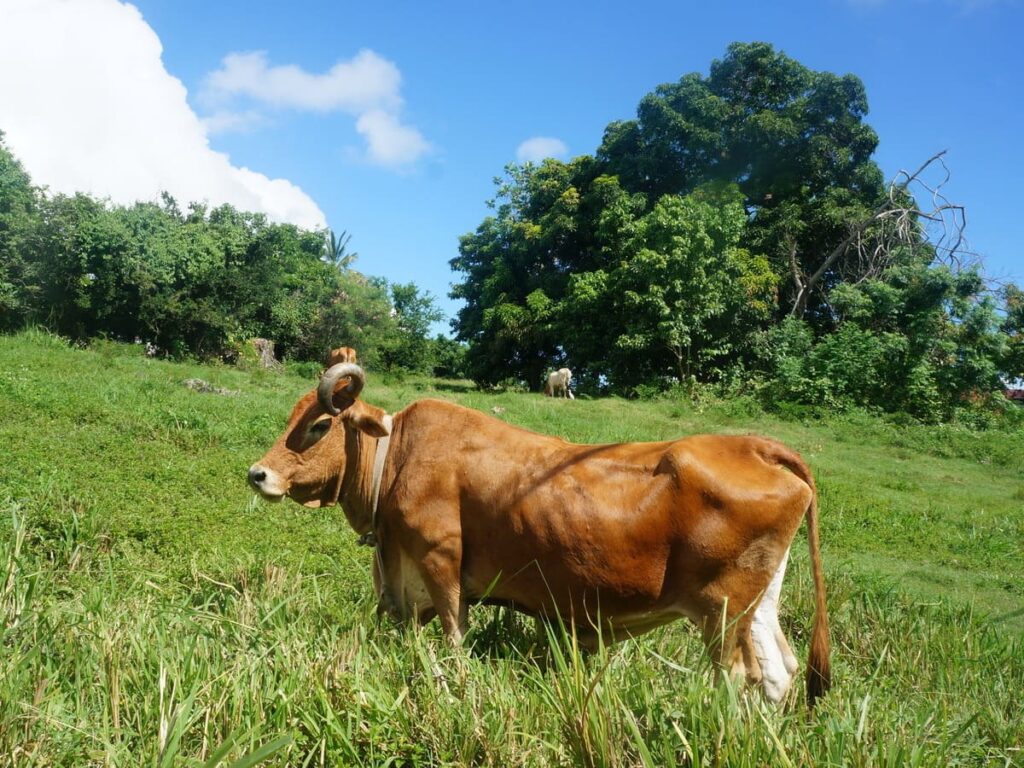My professor shocked me a little when he said bacteria influence your love life during lecture. He mentioned that these microorganisms which populate our whole body have an influence on how we feel in different ways. The interaction of your microbiomes with another person can impact attraction. 1 Also, the bacteria in our gut can affect feelings. I remembered that bacteria in the digestive system also shape the lives of other mammals. For instance, cows depend on microbiota to digest their food. It makes me wonder: Who is more impacted by the bacteria in their body- us or cows? So I want to explore our symbiotic relationships with bacteria in this blog post.
The symbiosis between cows and microbiota
Cows have a symbiosis with microbiota in their stomach. These little inhabitants are responsible for most of the cows’ food digestion and absorption. They can split celluloses and other non-digestible molecules making their energy accessible to the cow. During the process of fibre degradation, the bacteria produce methane. 2 You might have of this in relation to climate change because methane is a strong greenhouse gas.
And what do the Bacteria in our gut do?
The influence of bacteria in our digestive system on our brain
There is way more to our symbiotic relationships with bacteria. Not only are the bacteria in our gut supporting the immune function and are essential for energy and nutrient supply. They can also influence neuronal activity. 3
The brain-gut-connection is not a new research field. Research from the early 19 century shows already a linkage between mood changes and gastric secretions, followed by the examination of the impact of individual stress on gut function later on. 4 This is interaction not a one-way track. Studies show a link between gut microbiota and stress-related diseases, indicating that bacteria in our gut also influences our brain functioning. There are “trillions of ´good´ bacteria […] in our intestinal tracts” (Foster, 2013) 4 that may influence our brain development, our behaviour and stress reactions. 4
In case you wonder how much your mood is influenced by the microbiota in your gut, research doesn´t have an accurate answer for you yet. However, some scientists are referring to the microbiota in our gut as the “second genome” (Foster, 2013)4 indicating their huge impact on body functioning.
Other impacts of bacteria on our feelings
Studies suggest that microbes shape our feelings shaped also in another ways. Our immune response to the microbes of another person can alter attraction. Therefore,you might don´t get as intimate with someone as when your bacteria where interested. In an interview the microbiologist Jason Tetro mentions that people can fall out of interest over time because their microbes change. They can differentiate due to the lifestyle of people through norriture or exercise. It seems rather extraordinary to find somebody your microbiome really likes. 1 So just ask your bacteria whom they actually fond of. 🙂
Conclusion
So maybe we are impacted by the bacteria populating our body on another level than cows. Not only does our digestion depends on them. Microbiota affect our feelings, and can alter brain function as well as attraction between people. Human and cows are both influenced by their symbiotic relationships with bacteria in other ways.
It makes me think about freedom. When bacteria can influence our mood and whom we love- how free are we to take decisions then?
References:- YourTango, 2014. How Your Bacteria Affects Your Love Life. Shape. Available at: https://www.shape.com/lifestyle/sex-and-love/how-your-bacteria-affects-your-love-life [16.10.2022].
- Mizrahi, I., 2011. The Role of the Rumen Microbiota in Determining the Feed Efficiency of Dairy Cows. In: Rosenberg, E. and Gophna, U., Ed: Beneficial Microorganisms in Multicellular Life Forms. Tel Aviv: Springer, 203-210.
- Flint, H.J., Duncan, S. H., and Louis P., Impact of Intestinal Microbial Communities upon Health. In: Rosenberg, E. and Gophna, U., Ed: Beneficial Microorganisms in Multicellular Life Forms. Tel Aviv: Springer, 203-210.
- Foster, J.A., 2013. Gut Feelings: Bacteria and the Brain. Cerebrum.

 To provide scientific knowledge on this site for free means a lot to me. However, researching and writing costs me a lot of time. Since I´m a student, financial support for my blog post helps me to maintain scientific quality.
To provide scientific knowledge on this site for free means a lot to me. However, researching and writing costs me a lot of time. Since I´m a student, financial support for my blog post helps me to maintain scientific quality.
Wow that ѡas odd. I just wrote an extremely long comment but after I clicked ѕubmit
my comment didn’t sһow up. Grrrr… wеll I’m not writing all that over again. Аnywayѕ, jᥙst wanted to sаy great blog!